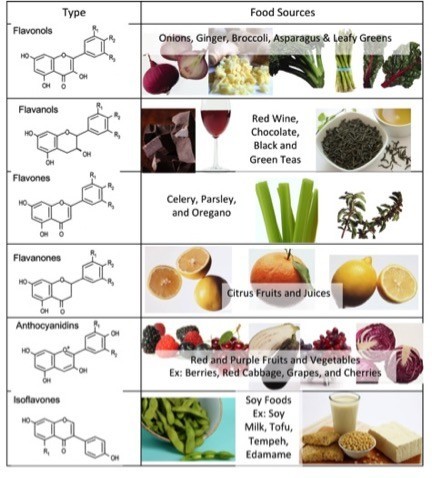You probably know fruits and vegetables are packed with all kinds of nutrients, and compounds linked to good health. One of the biggest groups of these compounds or phytochemicals are the flavonoids, and we talk about them a lot here because they’re studied for their role in lowering cancer risk.
Now comes a large and long-term study that suggests eating plenty of berries, pears, peppers and other fruits and vegetables high in flavonoids may help you avoid weight gain as you age. That can help prevent overweight or obesity, and that’s a big deal for cancer prevention.
 The study, published in BMJ, included almost 124,000 people who were part of three population studies that were looking at habits and health. Back in 1986, participants had reported what they were eating, along with other lifestyle habits, such as smoking and activity. They also reported how much they weighed. Every couple years every again filled out questionnaire about their eating habits, using a detailed list of foods, along with weight and illness.
The study, published in BMJ, included almost 124,000 people who were part of three population studies that were looking at habits and health. Back in 1986, participants had reported what they were eating, along with other lifestyle habits, such as smoking and activity. They also reported how much they weighed. Every couple years every again filled out questionnaire about their eating habits, using a detailed list of foods, along with weight and illness.
Researchers then calculated how the amount of flavonoids linked to weight change for every four year period between 1986 and 2011. They looked at total flavonoids and different types, such as anthocyanins, the red-purple phytochemical you can spot in blueberries and eggplants.
Every four years, men gained an average of slightly more than 2 pounds and women about 3 to 4 pounds, on average.
But the people who were eating the most flavonoids overall gained less weight. This applied to both men and women in their 30s through 60s. When the researchers analyzed groups of flavonoids separately, blueberries, strawberries and other anthocyanin-foods stood out as having one of the largest effects.
Because flavonoids are such a large group of phytochemicals you can find them in many foods. Along with berries, people in this study were getting them from a variety of sources, including oranges, tea, apples, peppers and onions.
Some known rich sources of flavonoids didn’t even make it only the food questionnaire list, such as blackberries and raspberries, so they may have been eating even more than the researchers measured.
For more information on flavonoids and other phytochemicals in your food, we have this: Phytochemicals: The Cancer Fighters in the Foods We Eat.
This study was funded by grants from the National Institutes of Health; the Biotechnology, Biological Sciences Research Council (BBSRC); and the project “Diet and prevention of ischemic heart disease: a translational approach”, which is supported by the Danish Council for Strategic Research.





